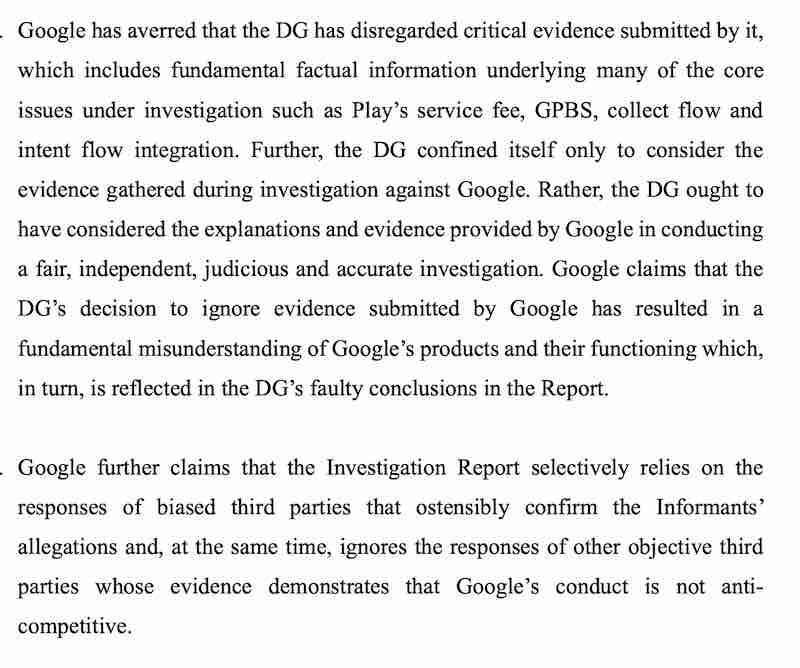The antitrust watchdog in India ordered the firm to allow app developers to use third-party payments processing service for in-app purchases or for purchasing apps, the second penalty on the firm.
The Competition Commission of India said that mandating developers to use Google's own billing system for paid apps and in-app purchases violates provisions of the nation.
The regulator interviewed several industry players as part of the investigation and said that the practice of not using the billing system for its own apps amounts to discrimination.
The investigation came to a conclusion.
Mandatory imposition of GPBS [Google Play Billing System] disturbs innovation incentives and the ability of both the payment processors as well as app developers to undertake technical development and innovate and thus, tantamount to limiting technical development in the market for in-app payment processing services. in violation of the provisions of the Act. Thus, Google is found to be in violation of the provisions of Section 4(2)(b)(ii) of the Act.
Mandatory imposition of GPBS by Google, also results in denial of market access for payment aggregators as well as app developers, in violation of the provisions of Section 4(2)(c) of the Act.
The practices followed by Google results in leveraging its dominance in market for licensable mobile OS and app stores for Android OS, to protect its position in the downstream markets, in violation of the provisions of Section 4(2)(e) of the Act.
Different methodologies used by Google to integrate, its own UPI app vis-à-vis other rival UPI apps, with the Play Store results in violation of Sections 4(2)(a)(ii), 4(2)(c) and 4(2)(e) of the Act.
India is the largest market for the internet search engine. Over the past decade, the company has poured billions of dollars in the South Asian market as it aggressively searched to find major undiscovered regions around the world.
Almost all of India's internet users are reached by the company. The local phone market is dominated by a single operating system. The UPI network, built by a coalition of banks, has become the most popular way for Indians to conduct online transactions.
Changes to the Play Store policies that allow developers to use third-party billing system must be in place by the end of the year.
Google shall not impose any anti-steering provisions on app developers and shall not restrict them from communicating with their users to promote their apps and offerings, in any manner.
Google shall not restrict end users, in any manner, to access and use within apps, the features and services offered by app developers.
Google shall set out a clear and transparent policy on data that is collected on its platform, use of such data by the platform and also the potential and actual sharing of such data with app developers or other entities, including related entities.
The competitively relevant transaction/ consumer data of apps generated and acquired through GPBS, shall not be leveraged by Google to further its competitive advantage. Google shall also provide access to the app developer of the data that has been generated through the concerned app, subject to adequate safeguards, as highlighted in this order.
Google shall not impose any condition (including price related condition) on app developers, which is unfair, unreasonable, discriminatory or disproportionate to the services provided to the app developers.
Google shall ensure complete transparency in communicating to app developers, services provided, and corresponding fee charged. Google shall also publish in an unambiguous manner the payment policy and criteria for applicability of the fee(s).
Google shall not discriminate against other apps facilitating payment through UPI in India vis-à-vis its own UPI app, in any manner.
The CCI said in a statement that it had directed the search engine to cease and stop anti-competitive practices.
In the last few years, Apple and Google have come under fire from developers for requiring them to use their own billing systems. The ability to use third-party payments for purchases on the Play Store in India is one of the things that is being explored by the company.
Last week, the competition regulator fined the company $161.9 million for anti-competitive practices and made a number of stringent remedies.
The watchdog was looking into whether or not there was a dominant position in five different markets: licensable OS for phones, app store, web search services, non-OS specific mobile web browsers and online video hosting platform in India. The regulator concluded that the market was dominated by the company.
The antitrust watchdog said that device manufacturers should not be forced to install apps from Google, and that the search giant should not deny access to its Play Services APIs. Over half a dozen hardware vendors indicated that they could not enter into a manufacturing relationship with Amazon due to fear of being retaliated against, according to the company.
The CCI's decision was a major setback for consumers and businesses and will raise the cost of mobile devices for Indians.
The order is being evaluated by the legal team, but no comment has been made. CCI said in the order that it expressed concerns about the evidence the regulators relied on.

The evidence was used to reach the conclusion. The page is from the order.